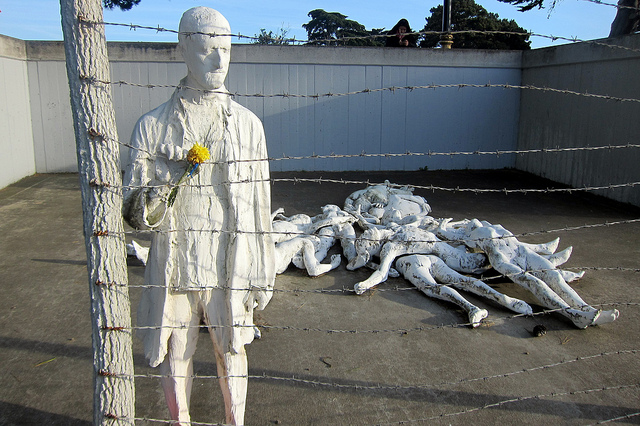Cambridge historian Richard J. Evans is the most eminent scholar of the Third Reich and the Holocaust writing in the English language today. He has to his credit numerous notable books, including works on the social and political history of Germany in the 19th and 20th centuries, significant contributions to the study of the historiography of modern Germany. Evans’ magisterial three volume history of Nazi Germany will be the state of the art for decades to come. (More…)
Author: MagadhMagadh is a teacher, writer, and musician based in Cleveland, Ohio. He is the co-editor of A Thousand Trivialities, a blog devoted to punk, metal, and alternative culture. When not writing or attending shows, he can usually be found cursing at his television during Arsenal matches.
Magadh is a teacher, writer, and musician based in Cleveland, Ohio. He is the co-editor of A Thousand Trivialities, a blog devoted to punk, metal, and alternative culture. When not writing or attending shows, he can usually be found cursing at his television during Arsenal matches.
The essays in Class War Conservatism have been judiciously selected. The first section begins with Miliband’s 1965 essay “Marx and the State” which provides an important preliminary for Miliband’s response to Nico Poulantzas’s review of The State in Capitalist Society (1969), along with Miliband’s critical pieces on Poulantzas’s Pouvoir politique et classes sociales (1968). (More…)
These days the name Miliband is most associated in the popular mind with the young wonks currently overseeing the bumbling demise of the British Labour Party. But there was a time not so long ago that Miliband was a name to conjure with. Ralph Miliband was one the leading lights of postwar British Marxism. (More…)
In a recently released open letter, a group of scholars and venture capitalists described the digital revolution as, “the best economic news on the planet.” This is the sort of thing likely to elicit hosannas from those whose situations in finance and academia have positioned them to reap the benefits of this revolution. (More…)
Of all the pricks against which the philosophically-minded person must kick, few are as galling as the persistent tendency of booksellers to shelve the works of Ayn Rand in their ever-dwindling philosophy sections. It’s bad enough that the works of Aristotle and Plato must compete for shelf space with titles like The Simpsons and Philosophy and the works of Bernard-Henri Lévy. (More…)
At a symposium sponsored by NASA in 1993, science fiction writer Vernor Vinge postulated that within thirty years, we would create a sentient artificial entity with superhuman intelligence. “Shortly after, the human era will be ended,” he concluded. This event, which he termed “the singularity” would change the balance of power on this planet, as humans would not be the smartest beings in the world. (More…)
The world is on the cusp of the greatest transformation of the nature of work since the industrial revolution of the 19th century, if not, arguably, since the invention of the wheel. The confluence of developments in cybernetics, robotics, and artificial intelligence will, in all likelihood, result in transformations so profound as to rewrite the rules governing human societies, if it does not wipe them out entirely. (More…)
The most important trend in recent historiography of the Cold War has been an expansion in interest in subjects outside tthe politico-military, and the economic. Twenty years ago, when Heide Fehrenbach published Cinema in Democratizing Germany, the perception that cultural issues were secondary was still widespread among scholars (particularly historians) of the postwar era. (More…)
When attempting to assess the work of the Slovenian philosopher Slavoj Žižek, one is tempted to do as Richard Bernstein did in a piece about Habermas in the 1980s and write two columns: one showing what a sympathetic, the other what an unsympathetic critic would say. (More…)
There’s a point in Don Letts’ Clash documentary Westway to the World where bassist Paul Simonon talks about the uncertainty that they all felt about their status after they’d signed their first record contract with CBS Records (for £100,000) in January 1977. (More…)
The drone war, as it has been fought to this point, has featured an effective interweaving of military and ideological considerations. Grégoire Chamayou’s A Theory of the Drone represents the most comprehensive attempt to untangle the most politically complex aspects of drone use, and to explore its and psychological implications. (More…)
Last May, I posted piece on the publication of the Schwarze Hefte, the heretofore unpublished notebooks kept by the prominent German philosopher Martin Heidegger. This event was getting a lot of press at the time, much more so than the emergence of unpublished works by a thinker few people have read and even fewer understand would usually do. (More…)











